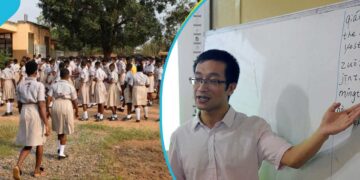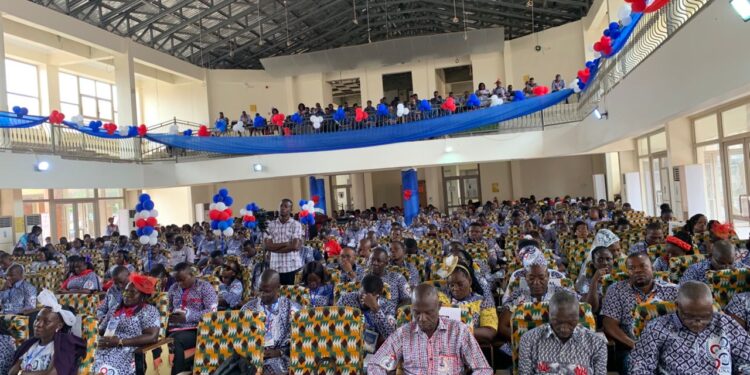Rector of the Nduom School of Business and Technology, Reverend Professor Daniel Adjepong Nyarko has cautioned against any attempt to abolish Ghana’s teacher licensure examination, describing such a move as a threat to the professional integrity of the teaching field.
To him the move would be a step backward if the attempt to stop it pulls through.
He recalled that nearly 20 years ago, his advocacy for teacher licensing sparked national debate and eventually led to the establishment of the National Teaching Council under the 2008 Education Act.
“I first called for the licensing of teachers in 2005, and it sparked national debate. It took ten years before the first licensure exams were held in 2018,” he said.
He delivered the keynote address at the opening ceremony of the 7th Quadrennial (54th) GNAT Central Regional Delegates Conference held at Nduom School of Business and Technology, Ayensudo in Cape Coast on Thursday, July 24, 2025.
He argued that if teaching is to be treated as a true profession, licensing must not only be maintained but also improved.
“Do we have any serious profession that does not license its members?” he asked.
Turning attention to the conference theme, “Educating the African Fit for the 21st Century: The Role of Policymakers and Unions in Ghana,” He stressed the emotional complexity of the 21st-century child, who now faces increased stress and anxiety from academic pressure and digital exposure.
The keynote speaker described the modern African child as digitally savvy and globally aware. According to him, today’s children are born into a connected world and often operate digital devices before they can read fluently.
“They are critical thinkers, innovators, and team players who thrive in inclusive environments,” Rev. Prof. Nyarko noted.
He called for greater emphasis on emotional intelligence, resilience, and civic engagement as essential aspects of education.
Addressing the role of stakeholders, Rev. Prof. Nyarko outlined clear responsibilities for both policymakers and teacher unions. He urged education policymakers to lead reforms in curriculum design, especially in STEM, digital literacy, and inclusive education, while also investing in infrastructure and teacher training.
“Equitable access to resources, especially in rural areas, is critical,” he said, adding that performance incentives and regular monitoring should be central to the education system.
He also called on unions like GNAT to go beyond advocacy for salaries and conditions of service, underscoring the need for them to protect child rights, build capacity among members, and actively engage in shaping realistic and impactful reforms.
In concluding his address, Rev. Prof. Nyarko emphasized the need for strong collaboration between policymakers and unions to build a resilient and future-ready education system. “Educating the African child today is not a linear task; it requires innovation, equity, and shared responsibility,” he said.
He challenged teachers and stakeholders to reflect deeply on the profession’s current state and commit to a renewed roadmap for the 21st-century educator.
“Only through united action can we lay a solid foundation for a globally competitive generation of African leaders,” he continued, wishing the conference fruitful deliberations.
The 7th Quadrennial (54th) GNAT Central Regional Delegates Conference seeks to discuss teacher welfare, professional development, education quality, review reports for the past four years, and elect new leaders for the next four-year term.
On his part, Central Regional GNAT Chairman, Benjamin Wilberforce Eshun, reaffirmed the union’s commitment to supporting all efforts aimed at improving education while resisting any disregard for teachers and their welfare.
He said GNAT, Central Region “will continue to collaborate with all who prioritize quality education, but we won’t hesitate to call out any blatant disregard for the teacher or the teaching profession.”
Mr. Eshun further called for a revision of school conduct rules to address the growing cases of student and parent assaults on teachers, describing it as a disturbing trend that must be addressed “before it becomes a societal crisis.”
Highlighting the union’s achievements from 2021 to 2024, Mr. Eshun pointed to the completion of several district secretariats, renovation of regional facilities, advocacy for Cost-of-Living Allowances (COLA) and implementation of the teachers’ collective agreement.
He outlined strategic priorities for 2025–2028, including improved service delivery to members, promotion of teacher well-being, support for career advancement, and continued infrastructure development.
Reverend Professor Daniel Adjepong Nyarko reaffirmed GNAT’s resolve to serve the needs of its members and strengthen the teaching profession across the region.
READ ALSO: Dr. Kenneth Aikins Advocates Constitutional Reforms to Protect Parliamentary Integrity
Source: Eric Sekyi/ATLFMNEWS




























